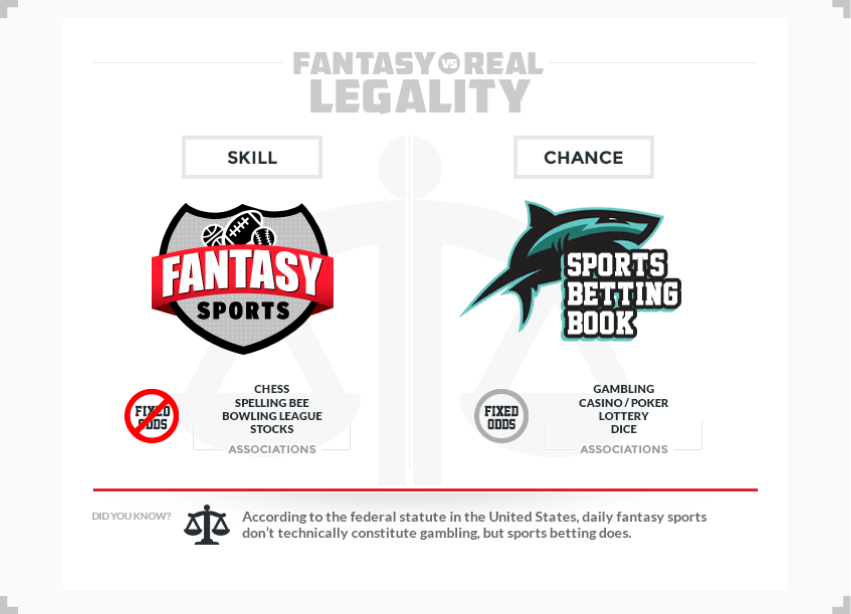Why Daily Fantasy Sports and Sports Betting Are Legally Distinct


In 2016, an estimated 57 million Americans legally invested money in daily fantasy sports competitions in the US. Winners and losers of these contests were decided on the results of real-life games, just as they were in ordinary sports betting.
If both sports betting and daily fantasy sports were based around real-life results of sporting events, why was it that daily fantasy sports got a pass in the eyes of the law, while sports betting at American-based sportsbooks wasn’t legal until May 2018?
There are a lot of differences between daily fantasy sports and sports, and we’ll take you through the main points in our guide.
Legally, It Comes Down to Skill vs. Chance
Every legal difference between daily fantasy sports (DFS) for example Underdog Fantasy and sports betting boils down to the distinction between games of chance, and games of skill. According to the federal statute in the United States, daily fantasy sports don’t technically constitute gambling, because of how they’ve been able to present (and market) themselves to both the public and lawmakers.
American daily fantasy sports companies like DraftKings and FanDuel have waged war against fantasy sports being labeled as “gambling.” Instead, these daily fantasy sports proponents prefer for DFS to be categorized as a skill-based game. These companies consciously bill themselves as being entirely different from traditional, chance-based sports gambling, and purposefully avoid using anything that resembles fixed-odds.
DFS sites prefer fantasy sports to be codified along with the likes of chess, spelling bees, bowling leagues, and the stock market. Their goal was to maintain as clean of a separation from sports betting and its associated stigma.
Of course, none of the negative stigmas around sports betting are necessarily justified, but that’s a different issue entirely. Learn more about where these negative attitudes come from in our three-part legal history of sports betting.
What Does the “Skill-Based” Explanation Mean?
Why daily fantasy sports are considered an exceptional, “skill-based” game mirrors the logic behind stock market traders being called skilled money managers (and not gamblers).
In the eyes of the law, stock traders don’t enter into a game of chance when they invest in stocks, bonds, futures, or options. They’re viewed as making “skill-based investments.” The expectation is that professional money managers (if they have the right training and understand the markets they participate in), can reasonably expect to profit from their investments.
When The Unlawful Internet Gambling Enforcement Act (UIEGA) was passed in 2006, it exempted fantasy sports, using the exact same rationale that makes participating in the stock market a lawful act.
Traditional fantasy sports, which initially lasted for the duration of a season (and were based on the real statistical performance of players), were not included in UIGEA because they relied on participants’ knowledge of their players’ skills. With the right application of expertise, proponents of DFS argued, a fantasy player could profit their investment of both time and money, just like someone playing the stock market.
UIEGA Makes a Special Exception for Daily Fantasy Sports
Daily Fantasy Sports didn’t exist until 2007, but they were grandfathered into UIEGA after their rise to prominence. Major DFS companies successfully promoted themselves as bearing enough resemblance to traditional fantasy sports, not sports betting.
In fact, UIEGA’s author said that he didn’t intend for the law he wrote to be applied to DFS in the first place, explaining that the bill made exceptions for fantasy sports, education games, and contests that “have an outcome that reflects the relative knowledge of the participants. He didn’t think that traditional sports betting should be classified under the same set of principles.
Making explicit reference to fantasy sports, he said that any “fantasy or simulation sports game, [that] has an outcome that’s determined predominantly by accumulated statistical results of sporting events – including any non-participant’s individual performances in such sporting events” should decisively not be ruled gambling.
Obviously, this endorsement went a long way to keep daily fantasy sports legal. When the author of a law is able to testify to the spirit of the law, it goes a long way.
Two More Crucial Distinctions Between Sports Betting and Daily Fantasy Sports
Other than the skill-based and chance based differences under the eyes of the law, there are two additional factors that proponents of daily fantasy sports contests point to in an effort to separate themselves from traditional sports betting.
1. Unlike Sports Bettors, Fantasy Players Often Play for Free
Bettors lay wagers on the outcome of sporting events, while a significant contingent of fantasy sports players participate in contests that have no monetary reward.
In fact, according to an IPSOS report from 2010, upwards of 74% of daily fantasy sports players played for no money or material prize. The same report also cited a survey that showed the most popular reason for playing fantasy sports were “enhancing my sports experience,” “to be in league with friends,” and “competing with friends.”
This isn’t to say sports bettors aren’t motivated by fun: Obviously, they are. However, the fact that real money is on the line in sports betting is inextricable from the overall experience.
Online sportsbooks don’t generally have (and never promote) sections where bettors can play for free. A brick and mortar sportsbook would never have an option for bettors to place bets without laying and cash down first. Sports betting and money are, for better or worse, inseparable.
2. Daily Fantasy Sports Don’t Have Fixed Odds
Even when they do involve cash prizes, DFS don’t pay out on fixed odds. As we discuss in our guide to sports betting legality, fixed payouts have been a chief characteristic of sports betting operations since their inception.
Daily fantasy sports structure their payouts in a variety of different ways, but in every case, the host website takes a cut or commission (aka vig) of the total buy-in on a contest. From there, they award the winners a set percentage of this pool.
This style of payout is borrowed from horse racing’s pari-mutuel distribution, where payouts are determined only after the contest begins and all the money has been collected for the contest.
As we discuss in part two of our guide to the legislative history of sports betting, this payout method was a crucial reason for why horse racing was legal at the federal level, and why sports betting was not.
DFS Sometimes Worked in Sports Betting’s Favor
Despite the notable differences between daily fantasy sports and sports betting, the acceptance of daily fantasy sports in mainstream United States may have actually helped pave the way for PAPSA to be stricken from the legislature in May of 2018. Online Daily Fantasy sports alone went a long way in changing American attitudes towards betting on sports.
As time wore on, and DFS became even larger in the public eye, more Americans began to associate daily fantasy sports with traditional sports betting.
By 2015, a survey indicated that the majority of the American public regarded daily fantasy sports as skill-based gambling, which was similar to how they compartmentalized sports betting. Further, there were academic studies that labeled daily fantasy sports as a form of betting, not a game of pure skill.
Pro Sports in America Embraced DFS First
The change in attitude towards the idea of placing money on the outcomes of sporting events also occurred at the highest levels, not just among regular Americans.
Despite their noted antipathy to anything related to sports betting, both the MLB and NFL were quick to sanction daily fantasy sports, and even helped market fantasy sports to their fans, offering monetized fantasy sports games on their own websites.
Some of the most prominent opponents of sports betting were American professional sports leagues. This changed with the advent of DFS, where professional sports expressly endorsed the idea of monetizing the outcomes of sporting events. In fact, every professional league in the United States (including NASCAR, NHL, PGA, and NBA) have come out and expressly supported fantasy sports.
This change in public attitude towards fantasy sports combined with a growing acceptance of sports betting with the public helped push the legalization of sports betting.
It’s not a reach to imagine that this substantial investment and involvement in daily fantasy sports caused professional sports leagues to loosen their strict attitudes towards betting. Sports betting and DFS might not be exactly the same, but they are both methods for Americans to lay real money down on the outcomes of sporting events.
Despite Their Differences, Sports Betting and Daily Fantasy Are Games of Skill
Ultimately, the reason it took so long for sports betting to become legal at a federal level was that it had too much baggage and checkered history. JockMKT are a new player on the DFS scene worth playing with!
DFS’ notable differences (combined with the fact that it didn’t exist in its current form until 2007) worked in its favor. Due to the structure of DFS games, as well as help from some very adept PR and marketing campaigns, it managed to largely avoid the same stigma that sports betting was saddled with.
Despite what lawmakers might think, we consider both daily fantasy sports and sports betting to be games of skill. So if you’re looking to equip yourself with the skills and knowledge you’re going to need to grow your bankroll when playing daily fantasy sports (or betting on sports), check out our resource betting guides!
Let's have fun and keep it civil.





